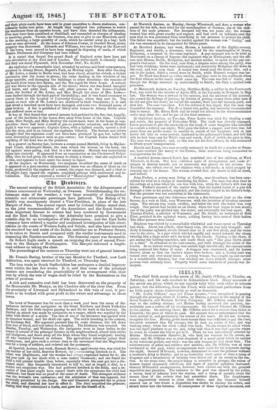IRELAND.
The chief Irish event is the arrest of Mr. Smith t Thurles, on Saturday, and his safe conduct to Kilmainham Gaol. O'Brien,dany accounts of the arrest are given, which do not exactly tally with each other in minute points; but the following, from the Times, with additional particulars from an Irish paper, seems trustworthy as well as dramatic.
"Mr. Smith O'Brien," says the Times account, " was recognized in passing through the principal street of Thurles, by Hulme, a guard in the employ of the Great Southern and Western Railway Company. Mr. O'Brien asked him the way to the railway station; and llulme having answered the question, im- mediately sent a soldier off for reinforcements. He himself followed Mr. O'Brien to the station. On arriving there, Mr. O'Brien asked for a second-class ticket to Limerick; the price of which he paid. His manner was so embarrassed that the clerk noticed it, and particularly the tremor of the hand: He did not, however, recognize his face. Having given more money than was sufficient to pay the fare, the clerk returned him 6d. change; but he took no notice of this, and was walking away, when the clerk called him back. On his return he asked which was the right platform to go to; and, being told that it was that opposite where he stood, he crossed the line to get to it. There he was immediately arrested by Hahne. Head-constable Hanover, D, who held the warrant for his arrest, as- sisted; and Mr. O'Brien was at once disarmed of a small pistol which he carried in his waistcoat-ket, and whim] was the only weapon he had about him. The reinforcement of police and soldiers now arrived; and Mr. O'Brien was at ones conducted to the gaol, where arrangements were made for his lodgment during the night. General M'Donald, however, determined to send the prisoner without a moment's delay to Dublin; and in an incredibly short space of time a troop of dragoons and a detachment of infantry were drawn out as an escort to the sta- tion. In the mean time, the people began to assemble in groups; the voices of women waxed eloquently rebellious, and signs of popular agitation increased. General M'Donald's arrangements, however, were carried out with the greatest expedition and precision. The entrance to the gaol was cleared by the police, a strong body of infantry held the station, and a troop of cavalry swept the streets clear of the crowds that had assembled there. The shopkeepers were imperatively ordered to close their doors; and the General himself entered one or two where a disposition was shown to disobey his orders, and struck terror into the inmates. In consequence of these vigorous measures, not
























 Previous page
Previous page